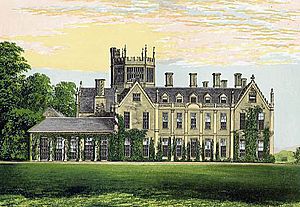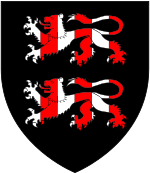Thomas Strangways (1643–1713) facts for kids
Thomas Strangways (born 1643, died 1713) lived at Melbury House in Dorset, England. He was a wealthy landowner and a politician who belonged to the Tory party. He served as a Member of Parliament (MP) in the English and later the British House of Commons from 1673 until his death in 1713. As a military leader, he helped fight against the Monmouth Rebellion. For his last nine years in Parliament, he was the longest-serving member, known as the "Father of the House."
Contents
Early Life and Family
Thomas Strangways was born in 1643. He was the second son of Giles Strangways, who was also an MP, and his wife Susanna Edwards. Thomas went to Wadham College, Oxford in 1660 to study.
By 1671, he was a captain in the local army, called the Dorset Militia. He became a colonel in 1675. In the same year, he married Susan Ridout. When his brother John passed away in 1676, Thomas inherited the large Melbury Sampford estate. He also made Melbury House even bigger.
His Political Journey
Thomas Strangways' father helped him get a special job called "Clerk of the Pells" in 1673. This was a job in the government's money department that didn't require much work. His father also helped him try to become an MP for Weymouth and Poole, but he lost those first elections.
However, he won the election for Poole in March 1673. This happened because of a deal with Lord Chancellor Shaftesbury, a powerful politician. In 1679, he became an MP for Dorset. This area was like a "pocket borough" for his family, meaning they had a lot of control over who got elected there. He also helped other politicians he supported get elected in Dorset. He was re-elected in 1681 and 1685.
Facing the Monmouth Rebellion
In 1685, the Duke of Monmouth led a rebellion against King James II. Thomas Strangways commanded his local army, the Red Regiment of Dorset Militia. They fought in the Battle of Bridport. Sadly, his brother Wadham was killed in a small fight during this time.
His regiment was very helpful during the rebellion. However, King James II did not reward him as Thomas expected. This made Thomas uneasy. He became even more worried when the King changed religious policies. Because he disagreed with these changes, he lost his local government jobs. The King's agents even tried to replace him in Parliament.
Despite his worries, Thomas was slow to support William of Orange, who later became King William III. But when William arrived in England, Thomas was one of the first leaders in Dorset to welcome him. He was elected to the Convention Parliament in 1689 and worked on the elections committee.
A Leader in Parliament
Thomas Strangways became a key leader for the Tories in Dorset. He was re-elected without opposition in 1690. Even though he often worked with the "Country party" (a group that wanted more power for Parliament), he was sometimes seen as a "Court Tory" (someone who also supported the King). He took time off from Parliament several times.
He was re-elected in 1695. In 1696, he refused to sign a document called the "Association." He also voted against setting the price of gold coins. Later that year, he voted against punishing Sir John Fenwick, who was accused of treason. In 1698, he tried again to get the "Clerk of the Pells" job, but he was not successful.
He was re-elected as a Tory in 1698. He was expected to oppose having a large standing army. He won elections again in 1701. He was put on a "blacklist" because he disagreed with preparing for war with France. In 1702, he supported a motion to defend the actions of the House of Commons in trying to remove some of King William III's ministers.
Thomas Strangways was re-elected in 1702. In 1703, he voted against changes to a bill about taking an oath. In 1704, he voted for a "tack," which meant adding a bill to a money bill to make sure it passed. He was re-elected in 1705. He voted against the candidate supported by the King for Speaker of the House. He also suggested giving more money to the Duke of Marlborough, a famous general. He helped create a bill to give the Duke a yearly payment of £5,000.
For his last nine years in Parliament, Thomas Strangways was the "Father of the House." This meant he had served longer than any other member. He was re-elected in 1708. In 1710, he voted against removing Dr. Sacheverell from his position. After the 1710 election, he was seen as a "Hanoverian Tory." He was also part of a group called the "October Club." He was one of the "worthy patriots" who found problems with how the previous government was run. He took time off due to illness in 1712. He stepped down from Parliament in 1713, and his son Thomas took his place.
Later Years and Legacy
Thomas Strangways passed away on December 21, 1713. He had five sons and four daughters with his wife, Susan. Three of his sons died before him.
His children included:
- Thomas Strangways (died 1726), who did not have any children.
- Elizabeth Strangways (died 1729). She inherited part of her brother Thomas's estate. She married James Hamilton, the 5th Duke of Hamilton, but she also did not have children. Her sister Susanna then became her heir.
- Susanna Strangways. She inherited part of her brother Thomas's estate and later all of her sister Elizabeth's estate. She married Thomas Horner, who was also an MP. As part of her inheritance, Thomas Horner and his future children took the Strangways last name and family crest. Their only surviving child was Elizabeth Strangways (born 1722). In 1735, when she was 13, she married Stephen Fox. He was 31 and the son of Sir Stephen Fox, who was very wealthy. As part of the marriage agreement, Stephen Fox also took the Strangways last name and family crest. He later became the Earl of Ilchester. They had many children together.
 | Anna J. Cooper |
 | Mary McLeod Bethune |
 | Lillie Mae Bradford |



